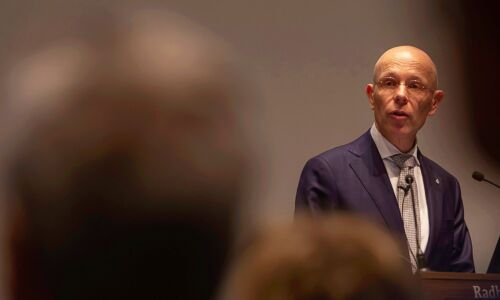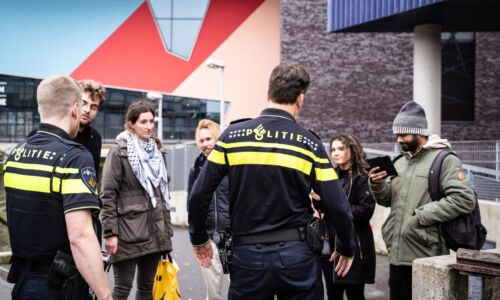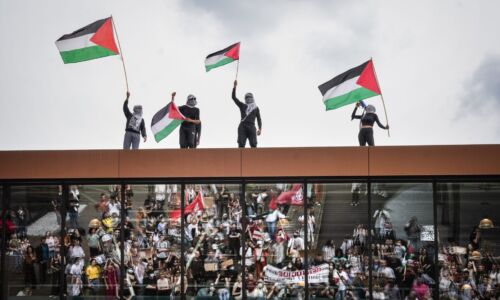University asks students and staff to share ideas about international partners
-
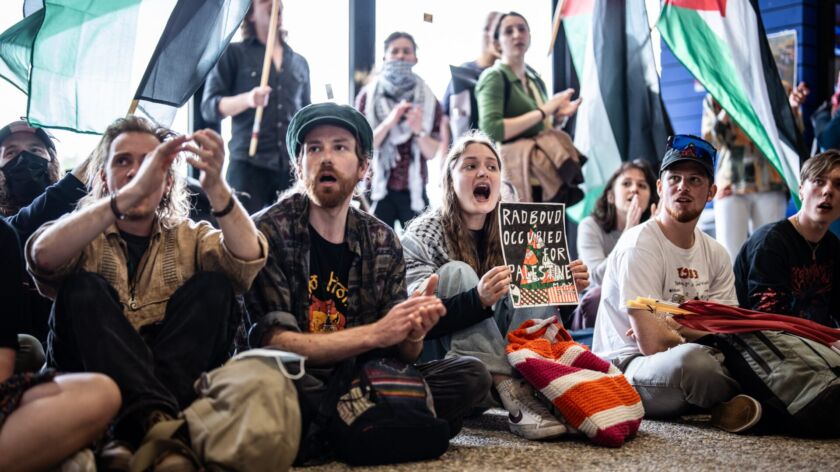 Pro-Palestinademonstranten bezetten het Erasmusgebouw, mei 2024. Foto: Johannes Fiebig
Pro-Palestinademonstranten bezetten het Erasmusgebouw, mei 2024. Foto: Johannes Fiebig
How do students and staff view collaborations with international partners? Following the protests against ties with Israeli institutions, Radboud University is organising five sessions to discuss the issue on campus.
Monday marks the start of the first ‘participation meeting on international cooperation’. The sessions are being held in response to the Pro-Palestine demonstrations that took place on campus last year.
Around twenty participants are welcome to attend each session. A total of five meetings are planned, three in English and two in Dutch. The sessions are being organised by Radboud Reflects and by Public Mediation, an external agency that advises the Executive Board on the design of the participation process.
Marcel Becker will act as moderator on behalf of Radboud Reflects. ‘Participants will be asked what they consider the biggest problem, the biggest tension, the biggest dilemma in this topic,’ says Becker, who is also Associate Professor of Philosophical Ethics and Political Philosophy. ‘I hope they will share their personal experiences.’
Becker says he is not so much looking for outspoken stances from participants. ‘I find the underlying arguments that lead to certain positions more interesting.’
Hebrew and Tel Aviv University
No minutes will be taken of the discussions, but the main arguments will be noted on a flipchart. ‘The outcomes will be shared with the Executive Board,’ said the university spokesperson. ‘The Executive Board will then share these with the committee and then also make them public.’
The committee in question is the International Partnerships Advisory Committee. The committee started work last October and its remit includes reviewing Radboud University’s partnerships with universities in large-scale conflict zones.
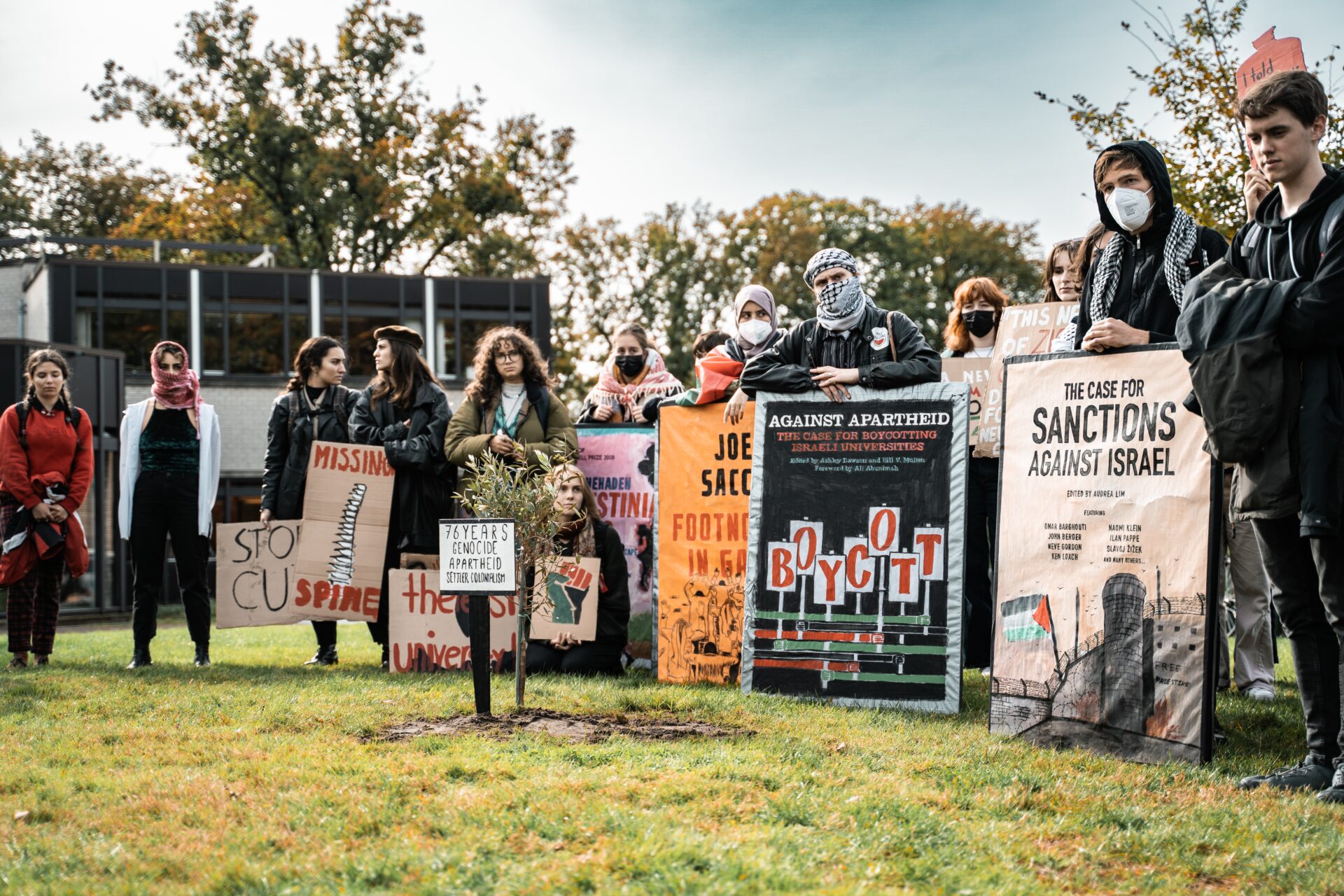
This obviously includes Israeli institutions, such as Hebrew and Tel Aviv University. Partnerships with these universities have been under intense fire for a year. Pro-Palestine demonstrators, who set up a tent camp on campus and also held several demonstrations last autumn, are demanding that ties with these universities be severed. The reason they cite is that these institutions are directly involved in the development of weapons and military technologies used in attacks on Palestinian civilians.
John Stuart Mill
The sessions could feature fierce debates, given that besides the Pro-Palestine demonstrators, there are students and staff who support cooperating with Israeli universities. Nevertheless, Becker thinks it could be a good thing to hear both views in the meetings.
The philosopher refers to a remark by John Stuart Mill, from the classic defence of freedom of speech. ‘According to Mill, an argument is only an argument once we have engaged theoretically with opposing viewpoints. So you only know what you think once you have at least discussed in your mind – but preferably in person – with someone else who disagrees.’
‘If you don’t go to the meetings, you can be sure your arguments won’t be taken into account’
The question, of course, is whether Pro-Palestine demonstrators feel the same way. In an opinion piece on Vox (university magazine) two Nijmegen Encampment students previously called the advisory committee a ‘bureaucratic smokescreen designed to buy time and distract from the fact that the university refuses to take a stand.’ It cannot be ruled out that they will see the participation meetings as another delaying technique of the Executive Board.
Yet Becker disputes the idea that so-called participation meetings are a form of sham participation. ‘In any case, the discussions will result in a document that will incorporate the arguments from all sides of the discussion,’ he says. ‘If you don’t go to those meetings, then you can be sure that your arguments will not be taken into account.’
Broader dialogue process
After these participation meetings, there will be another so-called ‘broader dialogue process on institutional and individual dilemmas in international partnerships’. What that will look like and the exact timetable is not clear at the moment. ‘That will partly depend on the outcome of the initial interviews to which staff and students have now been invited,’ said the university spokesperson.
Asked when the advisory committee expects to make a decision on Radboud University’s partnerships with Israeli universities, the spokesperson referred to article 6 of the committee’s mission statement, which includes a timeline. However, it does not include a concrete deadline for a decision on collaboration with Israeli institutions. It does say that in the pilot phase, which will run until March 2025, the committee will consider partnerships at the institution level.
